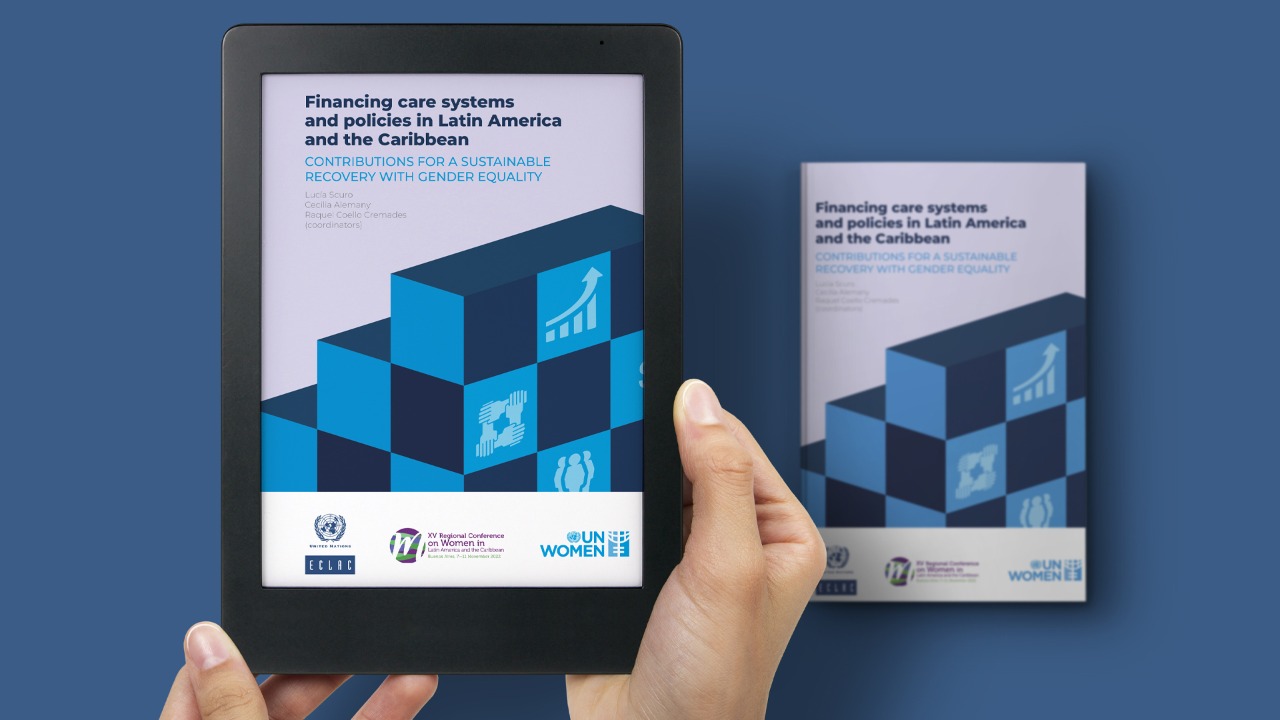Importance is Stressed of Investing in Comprehensive, Public Care Policies and Systems Aimed at Achieving Gender Equality and Promoting Their Financial Sustainability
Work area(s)
In the framework of the XV Regional Conference on Women in Latin America and the Caribbean, which is taking place in Buenos Aires, the joint ECLAC-UN Women document “Financing care systems and policies in Latin America and the Caribbean: contributions for a sustainable recovery with gender equality” was presented.

For more than four decades, ECLAC’s Member States have agreed upon the Regional Gender Agenda, aimed at guaranteeing the rights of women, moving towards achieving their autonomy and laying the foundation for building societies with equality. In this framework, the government delegates and specialists attending the XV Regional Conference on Women in Latin America and the Caribbean, which is taking place in Buenos Aires, Argentina, stressed today the importance of investing in comprehensive, public care policies and systems geared towards achieving gender equality and promoting their financial sustainability, during the presentation of the document Financing care systems and policies in Latin America and the Caribbean: contributions for a sustainable recovery with gender equality.
The report, produced jointly by the Economic Commission for Latin America and the Caribbean (ECLAC) and the United Nations Entity for Gender Equality and the Empowerment of Women (UN Women), was released this Thursday at a high-level panel of the XV Regional Conference on Women by Lucía Scuro Somma, Senior Social Affairs Officer of the Division for Gender Affairs of ECLAC, and Cecilia Alemany, Deputy Regional Director for the Americas and the Caribbean and ad interim representative in Argentina of UN Women.
The panel was moderated by María Inés Castillo, Minister for Social Development of Panama, and the document was commented upon by Mayra Jiménez, Minister for Women’s Affairs of the Dominican Republic; Gina Magnolia Riaño, Secretary-General of the Ibero-American Social Security Organization (OISS); Rania Antonopoulos, Senior Scholar of the Gender Equality and the Economy programme of the Levy Economics Institute; and Fabio Bertranou, Director for the Southern Cone of Latin America of the International Labour Organization (ILO).
In her introduction, Minister María Inés Castillo emphasized: “We are aware that the construction and promotion of comprehensive care systems would produce multiple positive effects, both in social and economic terms, as this document sets forth.”
Meanwhile, in her presentation of the report, Lucía Scuro recalled that since 1977, when the Regional Gender Agenda began to be forged, there have been milestones related to the financing of care in each one of the agreements reached by the governments of Latin America and the Caribbean.
“Protecting social spending and public investment, and strengthening tax collection and enhancing the tax architecture’s progressivity, is crucial for moving towards the care society in the region,” she stressed.
Meanwhile, Cecilia Alemany highlighted the five basic components of comprehensive care systems: the creation and expansion of services, regulation of services and working conditions, training and certification of care workers, information and knowledge management, and communication and cultural change.
“Investing in care systems creates a virtuous circle. It is a smart and sustainable investment,” she explained.
Mayra Jiménez, Minister for Women’s Affairs of the Dominican Republic, stated that the strengthening of the financial system with a gender approach must include accountability and follow-up on investments, to identify how diverse financing sources and strategies contribute in an equitable way to equality and well-being.
In her remarks, Gina Magnolia Riaño, Secretary-General of the OISS, indicated that there is a broad, general consensus about the need to make progress on care systems. “The challenge is how to make them possible and how to finance that care,” she underlined.
Meanwhile, Rania Antonopoulos, Senior Scholar of the Gender Equality and the Economy programme of the Levy Economics Institute, pointed up the region’s advances in terms of the analysis for care policy financing and noted that the document’s proposals are innovative and timely for the indispensable policies for care.
In his remarks, Fabio Bertranou, Director for the Southern Cone of the ILO, said that “beyond the programs and policies that the document mentions, it is necessary to have a care sector, which, like any other sector of the economy, requires a financing matrix, productive policies and policies to mobilize resources, including with the private sector. We must fulfill the longing to close the gaps in decent work.”
The Regional Conference on Women in Latin America and the Caribbean is the United Nations’ main regional, intergovernmental forum on women’s rights and gender equality. The meeting, which celebrates its 45th anniversary this year, draws the participation of representatives of government, United Nations and intergovernmental organizations, academia and civil society – particularly, women’s and feminist movements.
Follow the meeting with the hashtags #XVConferenceWomenLAC and #CareSociety
Related content

XV Regional Conference on Women in Latin America and the Caribbean
The fifteenth session of the Regional Conference on Women in Latin America and the Caribbean was held in Buenos Aires from 7 to 11 November 2022.
Related event

XV Regional Conference on Women in Latin America and the Caribbean
<p>The fifteenth session of the Regional Conference on Women in Latin America and the Caribbean was held in Buenos Aires from 7 to 11 November 2022.</p>
Type
Country(ies)
- Latin America and the Caribbean
Contact
Public Information Unit
- prensa@cepal.org
- (56 2) 2210 2040
